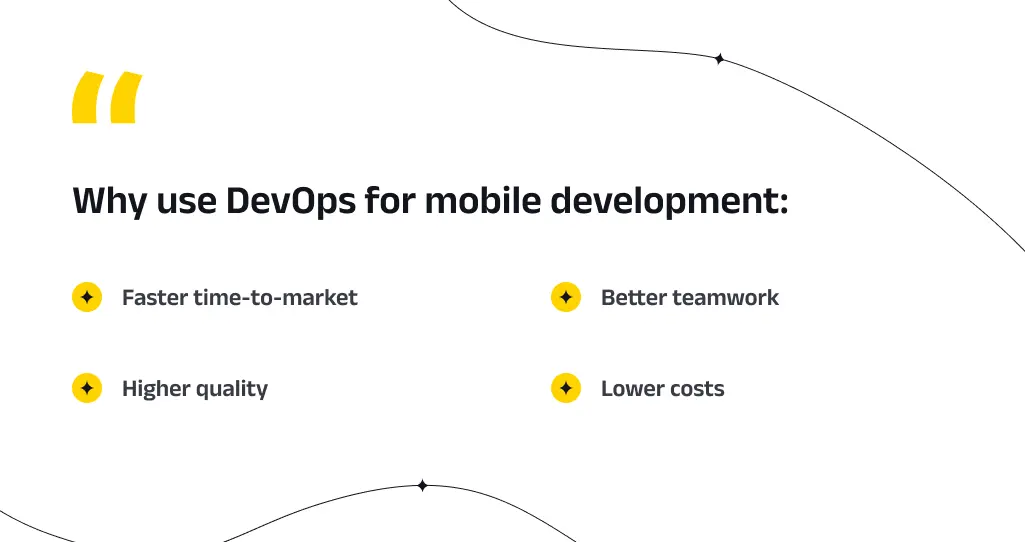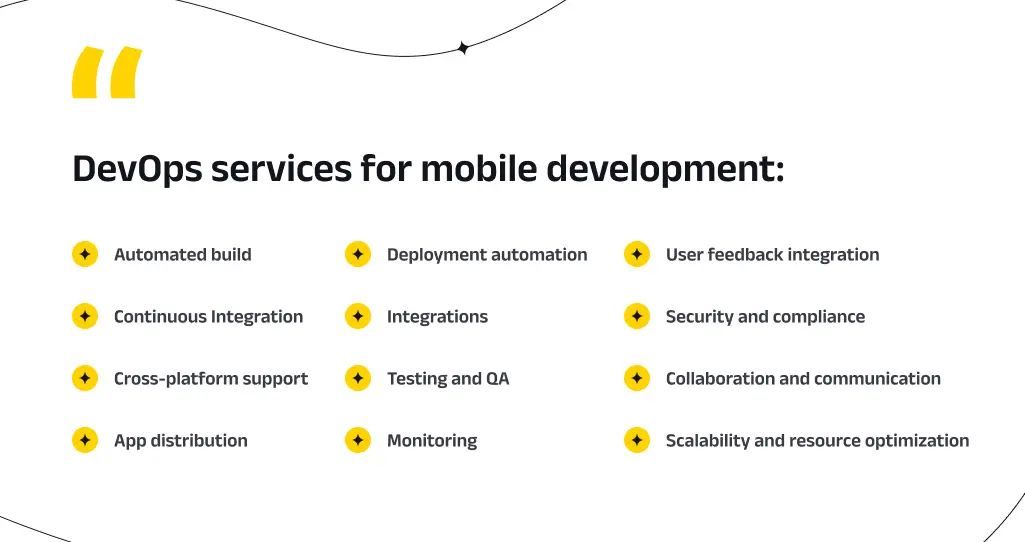Mobile app development has evolved way beyond just brainstorming innovative ideas and writing clean code. Success here hinges on the smooth collaboration between the dev and operations departments. That’s why DevOps as a Service has been gradually changing how mobile applications are built, tested, and pushed out into the world.
Let’s break it down further in the post and reveal the best impact it may have on your mobile app development project.
Why go for DevOps as a Service in mobile development?
DevOps as a Service, in simple terms, unites the brains behind development (Dev) and the guys handling operations (Ops). This blend is possible through a cloud-based service that focuses on teamwork, automation, and constantly keeping a watchful eye on the entire process. DevOps, as a managed service in mobile app development, ensures a painless and fast creation, testing, and deployment of applications across various devices and platforms.
Imagine a team making up a banking mobile app, and they go for a DevOps as a Service model. Automated testing is tailored for financial transactions, ensuring stringent security and compliance standards, while continuous integration swiftly identifies and rectifies issues related to features like fund transfers, account balances, and transaction histories.
This helps speed up the app’s creation, testing, and release. It means they can fix issues faster, reduce mistakes, and end up with a more dependable final app.
Implementing DevOps as a Service for mobile development brings a bunch of awesome benefits:
Quicker time-to-market: DevOps as a Service makes development faster, so companies can release their apps speedily.
Better teamwork: It helps teams work together smoothly, even if they’re in different places, which means better collaboration and sharing ideas.
Higher quality: Automation and constant testing make sure the apps are of great quality and work really well.
Saving money: Going for DevOps as a managed service lowers infrastructure costs and makes better use of resources, which saves money in the long term.
Let’s explore what exactly DevOps as a Service companies do to achieve these attractive outcomes.
What Exactly DevOps as a Service companies offer to mobile development
DevOps as a Service for mobile development is all about tackling the specific challenges of building mobile apps. Here’s what DevOps as a Service providers offer in the context of mobile development.
Automated build and continuous integration (CI)
DevOps as a Service automates the building of mobile apps, making sure that code changes get integrated, validated, and tested regularly. It assumes the entire infrastructure support (dev, stage, and prod environments). This speeds up things and fosters a transparent development process, cutting down on errors and amping up the quality of the code.
Picture a mobile app team at a social media company. They’re using DevOps, and when a developer drops some new code into their code stash, the computer robots take over, testing everything automatically on different phones and systems. This way, they catch and fix problems early, and then they add new things to the app.
Cross-platform support
Mobile DevOps as a Service companies provide solutions for managing cross-platform development. This includes tools and processes for building and testing apps that smoothly run on both iOS and Android. The goal is to deliver the best and uniform user experience across diverse gadgets.
App distribution and deployment automation
DevOps services help with the automated distribution of mobile apps to various app stores or enterprise distribution platforms. This involves managing deployment pipelines, versioning, and automating releases, making it easier to roll out updates and new features.
Integrations
Trendy mobile apps always want to be the ultimate all-in-one tool. So, the mobile DevOps needs to ensure everything connects as needed and without unnecessary developer attention to side things like API keys, passwords, etc.
DevOps helps connect the apps with other services like social media, weather forecasts, maps, ChatGPT, and even favorite music apps. All this without interrupting the development cycle.
Testing and quality assurance
DevOps practices for mobile development put a spotlight on automated testing for different devices, screen sizes, and operating system versions. This guarantees that the app performs reliably and consistently across a diverse array of mobile devices.
Imagine a team developing a popular iOS app that is used by millions of users. In a traditional development process without automated testing, they make a significant change to the app’s core functionality, but they don’t catch a critical bug during manual testing. This bug goes unnoticed until the app is released to users, resulting in a massive failure.
Monitoring
DevOps ensures monitoring throughout the development process, such as adding monitoring of builds. Monitoring usually includes:
- Monitoring builds before TestFlight
Before deploying a beta version to TestFlight, monitoring checks can identify issues early. For instance, automated checks can scan the code for vulnerabilities or standards violations. If issues are found, the build can be halted automatically, allowing developers to address the problems promptly.
- Support team monitoring
Support always needs to know what’s going on with the servers and other things. DevOps provides dashboards that show if everything is running smoothly. And if something goes wrong, the team gets a heads-up right away so they can jump in and make things better for the users.
- Accessibility monitoring
DevOps wants everyone to be able to use the apps, no matter what. So, they have tools that check if it’s easy to use, primarily for people with disabilities. If they find any issues, the team fixes them to make the app more inclusive.
- Alerting
DevOps watches your apps all the time. If something goes seriously wrong, like a server crashing, alerting sends a text or email. That way, the team knows there’s a problem, and they can fix it as soon as possible.
- Incident response
When DevOps spots big issues, they don’t waste time. They jump in, fix things up, and take notes on what happened. This helps prevent the same issues from happening again.
User feedback integration
DevOps tools keep an eye on the performance and health of mobile apps in real-time. Plus, they often integrate features for gathering user feedback and analytics, empowering developers to make data-driven decisions for tweaks and updates.
Think of a gaming app company that loves to hear what players have to say. They’ve got feedback forms in their game and use fancy tools like Zendesk or UserVoice. When gamers report problems or share ideas, it’s not ignored. The DevOps sorts it all out and tells the game creators what needs fixing or adding. That way, the game gets better and better, and players keep having a blast.
Security and compliance
DevOps services take on the mobile security concerns tied to app development. This includes sticking to secure coding practices, such as keeping an eye on the validity of the SSL certificate, regularly checking for security gaps, and making sure everything complies with industry regulations and standards.
Blockchain-Based Mobile App for Document and Data Security
Collaboration and communication
DevOps as a Service promotes teamwork among dev, operations, and QA teams. It typically includes communication tools and platforms that make collaboration smooth, helping teams work together happily, no matter where they are.
Scalability and resource optimization
Mobile DevOps services tap into cloud infrastructure and other scalable solutions to optimize resources as needed. This ensures that development and testing environments can scale up or down dynamically, supporting the growing needs of mobile app projects.
By getting on board with DevOps as a managed service for mobile development, organizations can conquer the fast-paced and competitive world of mobile apps, where quick development cycles and responsiveness to user feedback can make or break success.
One big thing in implementing DevOps in mobile development is understanding how different mobile platforms actually work behind the scenes. Seasoned DevOps professionals with good expertise surely know all the essential points where the mobile stack differs and needs special care.
Let’s look at the examples of these differences.
Differences in DevOps as a Service for Android, iOS, cross-platform, and mobile web app development
You might go for an app for either Android or iOS — or both individually. Alternatively, you could opt for a cross-platform app to save time and money, avoiding the need to create separate solutions for each platform. As a developer, you might also be exploring the option of a mobile web app or dealing with all these types simultaneously.
Now, what are the key distinctions in the development process for the leading mobile platforms?
Differences in DevOps as a Service for mobile development
Parameter | Android | iOS | Cross-Platform | Mobile Web Apps |
Development Tools | Android Studio, IntelliJ IDEA | Xcode | Xamarin, React Native, Flutter | Web-based frameworks like React |
Testing & Debugging | Emulators, Real Devices | Simulators, Real Devices | Simulators, Real Devices | Emulators, Real Devices |
Deployment | Google Play Store | Apple App Store | Multiple Platforms | Accessed via web browsers |
Device Fragmentation | High due to various devices | Low due to controlled ecosystem | Medium, streamlined development | Dependent on browser compatibility |
Updates & Maintenance | Regular updates, varied timing | Strict guidelines, synchronized | Unified updates, synced cycles | Easier, no app store submission |
DevOps Approach | Emphasizes open-source tools, wide compatibility | Leverages closed ecosystems, stringent control | Encourages unified pipelines, cross-tool compatibility | Focuses on web-based CI/CD processes |
As evident, the DevOps as a Service pricing and strategy will differ among mobile app platforms, not to mention the specific stack linked with each. Ensure that your DevOps team possesses hands-on expertise in the precise mobile development approach you choose for your product.
Struggling to set up DevOps for a mobile project?
In the fiercely competitive market of mobile app development, DevOps as a Service presents a potent approach to building high-quality mobile applications. The smooth fusion of development and operations facilitated by DevOps as a Service not only expedites the development cycle but also elevates the overall quality and dependability of mobile apps.
Armed with an understanding of the distinctions among iOS, Android, cross-platform, and web-based mobile apps, businesses can make informed choices in selecting the ideal DevOps as a Service company to drive their mobile app projects to success.



